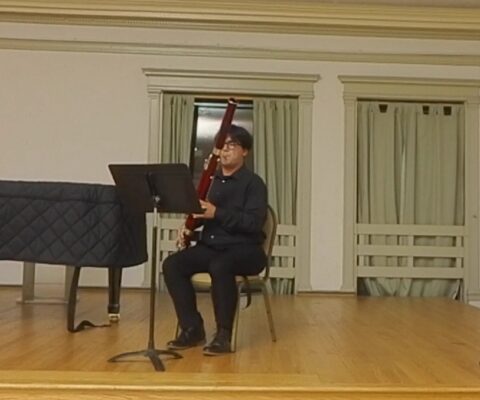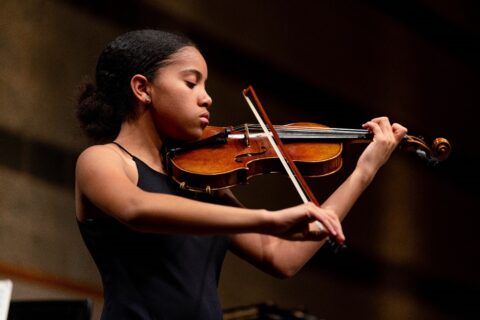College auditions for musicians are undeniably scary. Everything comes down to those ten minutes when you are playing for the teacher or panel. In this article, we will provide some tips from CMPI alumni to help prepare and succeed in your audition.
Preparing for Your Audition
In the months leading up to your audition, you will of course be practicing and having lessons. In addition, it is wise to play for as many people as possible, perform as often as you can, and rehearse with your collaborative pianist a number of times if your audition will be accompanied. As we are sure your parents will tell you, prioritize your self-care, getting enough sleep, eating well, and staying physically healthy. Unfortunately, auditions often fall during cold and flu season, so being as healthy as possible is of the utmost importance.
 Mental preparation is equally important. Most CMPI students have attended at least one workshop on mental preparation. If you have anxiety or difficulty in organizing your preparation, you may want to consider a few individual sessions with a coach such as Dr. Renée-Paule Gauthier, who has in the past provided sessions at a reduced rate to CMPI students. Also be cautious of burnout, especially since you will be playing the same repertoire for almost a year straight. Overuse injuries are also common during audition preparation, and any pain should be addressed immediately with a qualified physician or physical therapist.
Mental preparation is equally important. Most CMPI students have attended at least one workshop on mental preparation. If you have anxiety or difficulty in organizing your preparation, you may want to consider a few individual sessions with a coach such as Dr. Renée-Paule Gauthier, who has in the past provided sessions at a reduced rate to CMPI students. Also be cautious of burnout, especially since you will be playing the same repertoire for almost a year straight. Overuse injuries are also common during audition preparation, and any pain should be addressed immediately with a qualified physician or physical therapist.
Mock Auditions
In the weeks leading up to your audition, you should try to perform a few mock auditions. CMPI will set up at least one of these with actual teachers in the Chicago area, but you may also want to organize some of your own with your teacher, studio, or other seniors.
CMPI faculty member Sang Mee Lee sets up multiple mock auditions for her seniors and tries to make them exceedingly realistic – even having other students make noise, talk, or otherwise misbehave to mimic a distracted panel. Try to imitate the exact audition as much as possible. If your audition will be ten minutes in a dry classroom without accompaniment, you should practice exactly that situation. Similarly, if you know your audition will be held in a large hall with piano, practice how that feels. Try to have teachers, mentors, or friends act as the proctor and professors, so you can practice entering and greeting the panel, get used to being interrupted, and try out transitioning quickly from piece to piece.
Also consider doing at least one mock audition in your intended audition attire to make sure it is comfortable and not prone to any wardrobe malfunctions.
It can be very helpful to talk to CMPI or other program alumni who have already gone through the audition process at each of your schools. They may be able to give you specific information on how the process will look and feel, advice on collaborative pianists, and what type of space the audition will be held in.
Missing School and Other Obligations
Depending on how many auditions you do and where they are located, you may miss as much as two weeks of school, usually all in a four to six week period. Notify your school counselor and teachers in advance and try to keep up with your work remotely whenever possible. Long plane rides are great for getting homework done!
Unfortunately, sometimes teachers do not understand the audition process and will not be forgiving. While some districts allow college-related visits to be counted as excused absences, others, such as Chicago Public Schools, consider these visits to be unexcused. Providing your school with audition paperwork can help verify your absences in some cases.
It is also wise to actively lighten your schedule in the months of January, February, and March when most auditions occur. Turn down non-essential playing opportunities so you have time to practice and travel to auditions.
Directly Before Your Audition
 If you arrive in the days before an audition, note that some schools are unable to provide practice space. Many schools only provide a warmup room for 15-30 minutes directly prior to your audition. If this is the case, you may be able to practice in the hotel, especially if you have a mute for your instrument, or you may be able to reserve a local practice space for $10-50 an hour if necessary. Music Traveler is one company that provides this service, but other practice locations can be found with a simple internet search.
If you arrive in the days before an audition, note that some schools are unable to provide practice space. Many schools only provide a warmup room for 15-30 minutes directly prior to your audition. If this is the case, you may be able to practice in the hotel, especially if you have a mute for your instrument, or you may be able to reserve a local practice space for $10-50 an hour if necessary. Music Traveler is one company that provides this service, but other practice locations can be found with a simple internet search.
The most important thing you can do upon arrival is get a good night’s sleep before your audition. Make sure you are up early enough on the day of your audition to have a healthy meal and get to your audition site at least an hour ahead of time to let your instrument and body acclimate. Ensure that you are on time to any meetings, check-ins, or other events on your schedule.
The Actual Audition
When it is time for your audition, enter the room confidently (even if you are nervous!) and greet the panel warmly. First impressions matter!
Typically, you will be able to choose your first piece, so think about that in advance. Some panels will ask for a list of repertoire beforehand, while others will ask you what you would like to play on the spot. Take a deep breath and as much time as you need before starting. Expect to be stopped after two to five minutes of playing and asked to move on to another piece, which will not be of your choosing in most cases. Make sure you take some time to transition between pieces, taking a deep breath and changing your mindset. This will continue through several pieces until your time is up. Most auditions last around 10 minutes, though they may be slightly shorter or longer. Once you have completed your audition, smile and thank the panel and depart.
Most schools offer other activities on audition day, which may include music theory testing, an interview, financial aid presentations, tours, and similar events. If you have time, take advantage of these presentations. It is also worthwhile to spend some time in the neighborhood around the school, attend a concert, or meet with some students. In rare cases, schools may also offer you a trial lesson or 1:1 meeting with a teacher on audition day.
In some cases, there may be multiple rounds of live auditions. While this is unusual, it can present additional complications with travel arrangements without knowing which rounds you will make it through. It also adds another level of anxiety, since you will have to perform multiple auditions. If one of your schools has multiple rounds, make sure to prepare and practice that specific situation whenever possible.
Post-Audition Follow-Up
After your audition, it is best to send a thank you message to the teacher you auditioned for, if it is one specific teacher. A polite email thanking them for their time and expressing continuing interest in the school and program is all that is required.
In some cases, you may be auditioning for a large panel and not a specific teacher. In this instance, it may not be possible to send a thank you, unless you have had previous contact with a specific teacher.
Make sure you follow up with any continuing application requirements. Some schools ask for financial aid forms, teacher preferences, and other information during the time period between your audition and when results are released.
Waiting…
Once your auditions are complete, you will be in waiting mode. Most schools send out acceptances between mid-March and April 1, though results may be delayed, as they were in 2024 due to issues with the FAFSA financial aid form.
While this period of waiting can be tedious, it is also the time when you can put away your audition repertoire, rest, and relax a bit. Learn some new pieces and enjoy the last few months of high school. Decisions are now out of your hands, and you have done all that you can do!
Images
Stock images
